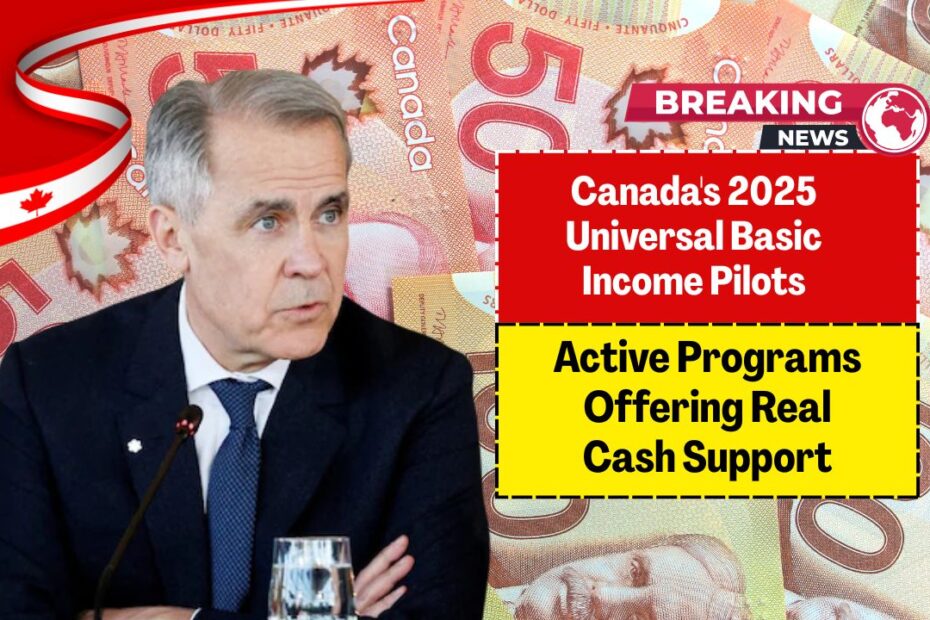Canada doesn’t yet offer a universal basic income, but in 2025, several pilot experiments and targeted cash programs at provincial and demographic levels are testing versions of income support.
These initiatives provide unconditional or semi‑conditional assistance to vulnerable groups—homeless individuals, older adults nearing OAS eligibility, and those with limited work capacity.
Overview of 2025 UBI-Style Initiatives
| Province / Program | Type & Benefit | Target Group | Key Outcome / Feature |
|---|---|---|---|
| British Columbia – New Leaf Project | $7,500 lump sum (2018 & 2022 rounds) | Homeless persons | Participants spent 99 fewer homeless days, faster housing access |
| Newfoundland & Labrador | Monthly financial aid | Low-income adults aged 60–64 near OAS | Provides support pre-pension |
| Prince Edward Island – T-BIG Pilot | Cash top-up to reach 85% of poverty line | 600+ low-income individuals | Helps raise incomes closer to poverty threshold |
| Quebec Basic Income Program | ~$1,309 monthly | Long-term work-limited individuals | Regular income for those with reduced work capacity |
| Ontario Basic Income Pilot (2017–19) | Up to $16,989/year single; $24,027/year couples (scaled with income) | Low-income 18–64 in select cities | Improved finances, nutrition, reduced stress; cancelled early |
| Guaranteed Income Supplement (GIS) | Up to $1,087/month (single senior) | Low-income seniors 65+ receiving OAS | Automatic benefit adjusted for inflation |
Program Highlights and Analysis
BC’s New Leaf Project
This one-time cash transfer program gave $7,500 to homeless participants and delivered remarkable results: a 99-day reduction in homelessness, faster transitions into stable housing, improved food security, and no increase in substance use.
Provincial Targeted Assistance Programs
- Newfoundland & Labrador provides monthly cash to low-income adults aged 60–64, offering early support before Old Age Security kicks in.
- Prince Edward Island’s T-BIG Pilot, launched in 2021, top-ups incomes so participants reach 85% of the poverty threshold.
- Quebec’s program delivers about $1,309 monthly to individuals with long-term limited capacity to work.
Ontario Basic Income Pilot (2017–19)
A bold initiative offering substantial annual amounts—$16,989 for singles, $24,027 for couples—adjusted based on earned income.
While cancelled after 10 months, it proved effective: improved nutrition, reduced stress, better housing options, and participants reported enhanced long-term planning and autonomy.
Guaranteed Income Supplement (GIS)
Not a pilot, but a longstanding federal benefit, the GIS provides up to $1,087 monthly to low-income seniors over 65 receiving OAS. It’s inflation-adjusted and automatically administered—offering income stability.
Why These Initiatives Matter
- These targeted UBI-style programs allow Canada to explore the practical, real-world impact of providing unconditional or semi-conditional cash to vulnerable populations.
- Data shows significant social benefits, including decreased homelessness, better health outcomes, and improved financial security.
- Ontario’s pilot and BC’s New Leaf model illustrate how such programs can empower recipients, reduce stress, and promote self-reliance.
While Canada has not yet implemented a universal basic income, 2025 features a robust slate of pilot experiments and targeted income programs.
From cash grants for the homeless to monthly top-ups for seniors and low-income adults, these initiatives demonstrate measurable benefits—helping inform policy development, reduce poverty, and improve well-being.
